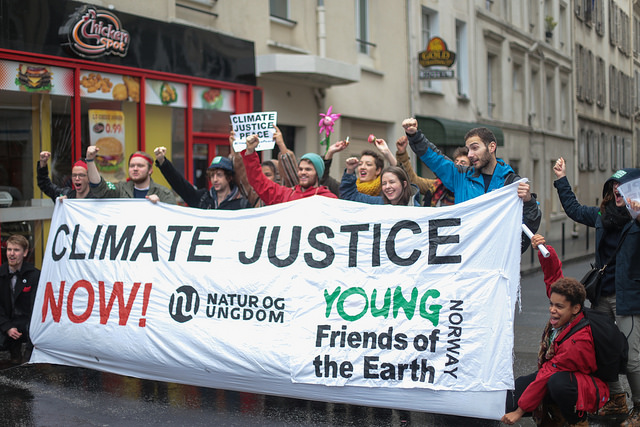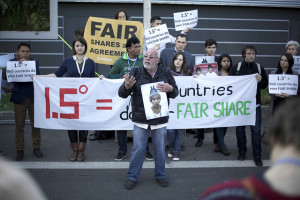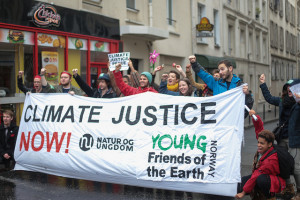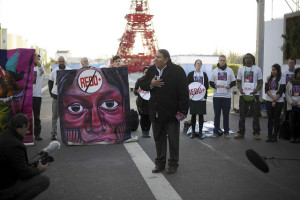
Did the Paris climate agreement deliver what people need?
Friends of the Earth International, civil society groups, trade unions and community groups had agreed the ‘People’s Test on Climate‘ by which to judge the Paris talks back in June 2015. The test was effectively a series of demands to use as a yardstick to measure the Paris Accord. I draw on this below, along with Friends of the Earth International’s verdict and highlights from the New Internationalist’s scorecard.
- Catalyse immediate, urgent and drastic emission reductions in line with what science and equity require, deliver urgent short-term actions, building towards a long-term goal that is agreed in Paris, that shift us away from dirty energy, marking the beginning of the end of fossil fuels globally, and that keep the global temperature goal in reach
The Paris Agreement aims to keep temperature rise below 2 degrees above pre-industrial levels, but there is no obligation to keep global warming under 1.5 degrees, just to ‘pursue efforts’ to do so. The text refers only to net zero ‘climate neutrality’ by the end of the century, if possible, but no goal is set for peaking in emissions. The overall agreement has nothing by way of fair, science-based binding targets for developed countries, only a formal inclusion of countries’ own (voluntary) emissions reductions pledges (INDCs) which had been drawn up before COP 21 and are now in the text. This, along with the fact that finance provisions for an energy shift in developing countries are weak, means that the 2 or 1.5 degree targets is meaningless. As Friends of the Earth point out, ‘stating an intention to meet these goals without any substance on implementation is insufficient. Current pledges have been calculated to result in at least 2.7, and probably over 3 degrees of warming which is incompatible with climate science’. Their view is that committing to keeping temperatures below 1.5 degrees must go hand in hand with requiring rich countries to do their bit, otherwise the burden falls on the poor. A fair shares approach based on a strict carbon budget is the fairest way to do this. It is not in the Agreement.

The importance of Equity and ‘Common But Differentiated Responsibilities’ (CBDR) has also been weakened. The phrasing has moved from countries acting ‘in accordance with’ these principles, to their actions ‘reflecting’ them, meaning that rich countries have undermined these founding principles of the convention and shirked their responsibilities. There are no pre-2020 goals for mitigation action, and no plan to strengthen pre-2020 ambition. There will be a ‘stock take’ in 2018 to see if post-2020 pledges are on target and every 5 years after that, but no obligation to increase efforts based on this review.
Some reactions:
Asad Rehman, Global Campaign to Demand Climate Justice: ‘This agreement is a great escape for the big polluters, and a poisoned chalice for the poor. We’ve got some warm words about temperature levels, but no concrete action. Rich countries aren’t pledging to do any more about their inadequate emissions reduction targets which are going to lead us to 3.7° warming of the planet. None of the developed countries are doing their fair share to reduce their emissions and move away from dirty energy.’
Kevin Anderson, Tyndall Centre for Climate Change Research: ‘The Copenhagen text included aviation and shipping emissions, that together are as large as the emissions of Britain and Germany combined, but they are not mentioned in the Paris text.’ Overall, the agreement ‘is weaker than Copenhagen’ and ‘not consistent with the latest science’.
Steffen Kallbekken, Director of the Centre for International Climate and Energy Policy: ‘by the time the pledges come into force in 2020, we will probably have used the entire carbon budget consistent with 1.5°C warming. If we stick with the INDCs we will have warming between 2.7°C and 3.7°C.’
New Internationalist: ‘In order to have a decent chance of reaching that 1.5° target, we need to keep at least 80% known fossil fuels in the ground and halt the exploration and extraction of new sources. We need to stop deforestation and reduce other greenhouse gases such as methane, by tackling major drivers such as the growth of animal agriculture. But the Paris agreement contains no mention of the words ‘fossil fuel’ – no coal, no oil, no gas – and not a whisper about the livestock, palm oil and other industries driving deforestation either.
2. Provide adequate support for transformation: ensure that the resources needed, such as public finance and technology transfer, are provided to support the transformation, especially in vulnerable and poor countries
The only legally binding ‘finance’ obligation for developed countries is that they must report on finance they provide. The goal of mobilising $100bn a year from 2020 has now become a weaker ‘COP decision’. Developed countries now only ‘intend to continue’ that level of support through 2025. A process to set a goal of a minimum of $100bn per year by 2025 will happen sometime before 2025. This means that there is only a process in place rather than concrete commitments. Although the Accord is clear that rich nations should provide the money, it does not guarantee how much or how they are going to do so. This means private finance can be involved and the pool of donors to developing countries may be broadened.
The nature and purpose of the finance is also unclear: the words ‘new’, ‘additional’, ‘adequate’ and ‘predictable’ did not get into the text, allowing crucial funding for development and fighting poverty for developing countries to be diverted to climate policies/limiting emissions. Developed countries are only tasked with ‘assisting’ developing countries to mitigate. Friends of the Earth International’s view is that it should not be about ‘assistance’, but be about rich countries doing their fair share of the global effort by providing finance to developing countries to see an energy transformation.
Some reactions:
The International Energy Agency: the transformation to a fossil-free world will require $1,000 billion per year by 2020.
New Internationalist: $670 billion – will need to be spent in developing nations, hence the need for a significant transfer of finance from North to South. This is only fair as industrialized nations have grown so wealthy by burning fossil fuels for the last 200 years; countries containing just 10% of the world’s population are responsible for 60% of the greenhouse gases currently in the atmosphere. The Agreement only commits to ‘mobilizing’ $100 billion per year by 2020, to cover not just emission cuts but also adaptation, far short of the support required, and there is no firm commitment to increase this figure, merely an aspiration to review it by 2025. Meanwhile, the definition of ‘mobilize’ is purposefully broad, to include loans, private finance, grants with strings attached, and the reallocation of aid budgets – even talk of calling the money sent home by migrants working in richer countries a form of climate finance, and counting it towards the total ‘mobilized’ by those rich countries.
Janet Redman, Director of the Climate Programme, Institute for Policy Studies: ‘We spend $2,000 billion a year on our military and mobilized $14,000 billion to bail out banks. Wealthy nations have to shift money from banks and tanks to clean energy and climate resilience.’
3. Deliver justice for impacted people: enhance the support to adaptation in a new climate regime, ensure that there will be a separate mechanism to provide reparations for any loss and damage that goes beyond our ability to adapt, and make a firm commitment to secure workers’ livelihoods and jobs through a Just Transition.
The Paris Agreement recognises that more funding is needed for communities for climate adaptation over the next five years but there are no contain concrete steps to ensure this happens. ‘Loss and Damage’ is in the agreement, but the wording specifically excludes compensation and liability. There is no concrete structure in place for climate refugees, and no finance to address irreparable damage, so vulnerable countries will be left to pick up the pieces, a step backwards for loss and damage. The US pushed this text on small island countries, supported by the Umbrella group and the EU. ‘Just transition’ for workers is now only mentioned in the preamble to the Agreement, not the body of the text, meaning that it not a binding commitment.

Some reactions:
New Internationalist: The crucial principle (‘Common but differentiated responsibility’) has been watered down in the Paris text at the behest of the US and other industrialized nations. Rather than a clear statement that richer countries should provide finance to poorer nations for adaptation, the Paris deal says developed countries should ‘take the lead’ on providing finance, as part of a ‘shared effort’ by all parties.
Asad Rehman: ‘the EU, the US, and the umbrella group of rich countries have imposed a clause absolving them of the legal, moral and political responsibility for the carbon pollution that they’ve created and that has devastated the lives and livelihoods of millions of people’.
New Internationalist: ‘The concept of a just transition – that governments should provide training and financial support to ensure that workers in the fossil fuel industry can find alternative employment in the shift to a zero-carbon world – is mentioned in the preamble but not in the core, agreed text of the Paris deal. The requirement that human rights should be taken into account is no longer in the text. The rights of Indigenous peoples has also been removed from the binding part of the text.
4. Focus on transformational action: ensure that renewable and efficient solutions are emphasised rather than false solutions that fail to produce the results and protection we need, such as carbon markets in land and soil, dangerous geoengineering interventions, and more.
The goal of climate or carbon neutrality by 2100 in practice means that if geo-engineering and other harmful market-based or unproven tech solutions are in place, emissions can continue even after then. These options are not ruled out. The door is also open for markets to exploit the climate crisis, without any limitations specifically in the text. In the case of REDD+ it will lead to developed countries supporting damaging plantation projects in developing countries instead of reducing their fossil fuel emissions at home.
Some reactions:
New Internationalist: The agreement talks vaguely about ‘technologies’ and ‘actions’ but these are not defined. Renewable energy is mentioned once, vis a vis Africa. The deal aims to ‘achieve a balance between anthropogenic emissions by sources and removals by sinks of greenhouse gases in the second half of this century’. This could mean anytime between 2050 and 2100, when a 1.5 degree target would require a definitive end to fossil fuel use by 2050. The language used also allows for the possibility of continued fossil-fuel burning ‘offset’ by ‘removals’ via (dubious) carbon capture, geoengineering or forestry schemes. Carbon trading mechanisms, so ineffective at cutting emissions can still play their part – with ‘internationally transferred mitigation outcomes’ recognised in the text as a legitimate solution. There is no reference to effective and fair solutions e.g. respecting the land rights of forest peoples, promoting clean democratic energy or ensuring food sovereignty for communities and small farmers which would keep carbon safely locked up underground, in trees and soils. Regulations to rein in destructive industries, halt deforestation and keep fossil fuels in the ground are not in the text nor are there references in the Agreement to give it precedence over trade agreements such as TTIP & TPP which threaten to give corporations the power to overturn environmental regulations that affect their profits.

Dallas Goldtooth, Indigenous Environmental Network: ‘The Paris agreement is a farce. Any discussion of carbon markets and carbon trading is a false solution. The truest solution, backed up by science, is that we have to keep fossil fuels in the ground. We must see a moratorium on fossil fuel development, and a just transition for all those communities that are dependent on fossil fuel economies. Whether we’re from the global north or the global south, we need help and support to create a future that has renewable energy for 100 percent of people on this planet.’
George Monbiot: ‘even 2C, in view of the weak promises governments brought to Paris, is wildly ambitious. Though negotiated by some nations in good faith, the real outcomes are likely to commit us to levels of climate breakdown that will be dangerous to all and lethal to some. Our governments talk of not burdening future generations with debt, but they have just agreed to burden our successors with a far more dangerous legacy: the carbon dioxide produced by the continued burning of fossil fuels, and the long-running impacts this will exert on the global climate.’
He notes that 2C of warming will lead to large parts of the world’s surface becoming less habitable, the people of these regions likely to face wilder extremes: worse droughts and floods, greater storms and, potentially, grave impacts on food supply. A combination of acidifying seas, coral death and Arctic melting would mean that entire marine food chains could collapse. On land, rainforests may retreat, rivers fail and deserts spread. Mass extinction is likely to be the hallmark of our era. He suggests that a maximum of 1.5C, now an aspirational and unlikely target, was actually achievable at the first UN climate change conference in Berlin (1995), but two decades of procrastination, caused by lobbying by the fossil fuel lobby, coupled with the reluctance of governments to explain to their electorates that short-term thinking has long-term costs, means that the window of opportunity has almost closed. If the talks in Paris are the best there have ever been, this is a terrible indictment. He also notes that the UN climate process has also focused entirely on the consumption of fossil fuels, while ignoring their production. ‘In Paris the delegates have solemnly agreed to cut demand, but at home they seek to maximise supply.’
Gerry Arances, National Coordinator of the Philippines Movement for Climate Justice: ‘India is flooding. Every year the Philippines is suffering. We are discussing 1.5C or 2C while 0.86C is already killing us. For those of us in the south, we might not still be alive.’
New Internationalist: Germany and France were praised late last week for their new support for 1.5C as the temperature goal. ‘This is historic,’ said Emmanuel de Guzman, head negotiator for the Philippines. ‘The call of the vulnerable has been answered by the presidency of the COP and the largest economy of the EU host region.’ Standing before climate justice movement leaders, Asad Rehman, Friends of the Earth offered another perspective: ‘When Germany and France mentioned 1.5C, we laughed. It’s hypocritical. If they really meant it they would have arrived with commitments starting before 2020.’ Rehman spelled out the history that has got us to this point: ‘Rich countries want the South to pick up the tab for them getting rich on dirty energy. They want to stay rich and keep us poor. Hundreds of thousands are dying. This is an issue of justice.’ Across, the city, US Secretary of State John Kerry devastatingly confirmed Rehman’s words: ‘It is time to eliminate the differentiation between developing and developed countries.’ (It was also revealed that the US would support loss and damage wording only if there is an agreement that compensation and liability issues would never be raised in future.)
Máire McCormack is Chair of Friends of the Earth Scotland
